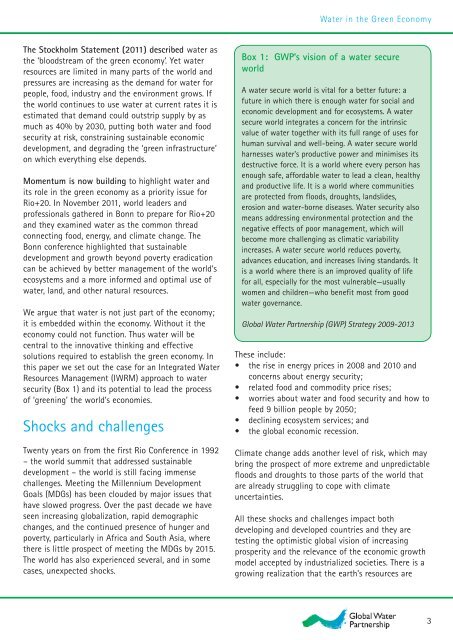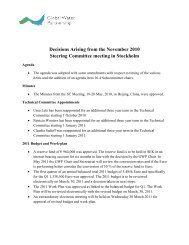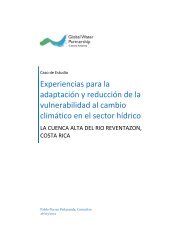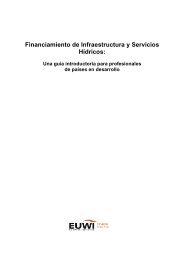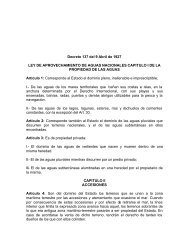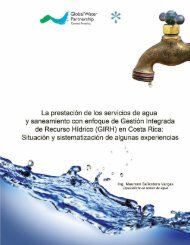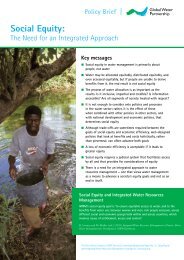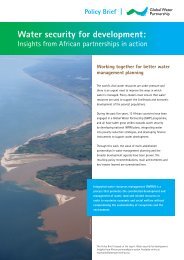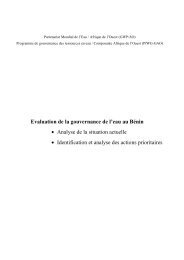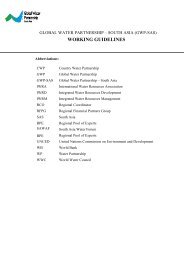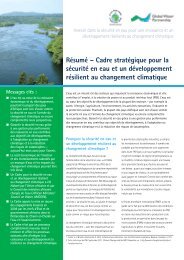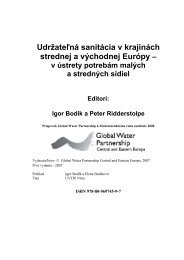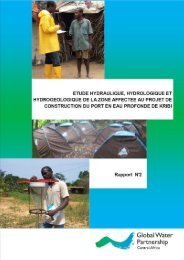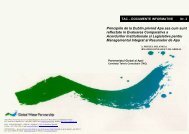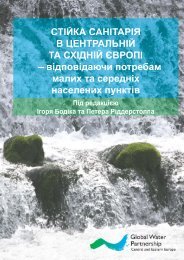Water in the Green Economy - Global Water Partnership
Water in the Green Economy - Global Water Partnership
Water in the Green Economy - Global Water Partnership
You also want an ePaper? Increase the reach of your titles
YUMPU automatically turns print PDFs into web optimized ePapers that Google loves.
<strong>Water</strong> <strong>in</strong> <strong>the</strong> <strong>Green</strong> <strong>Economy</strong>The Stockholm Statement (2011) described water as<strong>the</strong> ‘bloodstream of <strong>the</strong> green economy’. Yet waterresources are limited <strong>in</strong> many parts of <strong>the</strong> world andpressures are <strong>in</strong>creas<strong>in</strong>g as <strong>the</strong> demand for water forpeople, food, <strong>in</strong>dustry and <strong>the</strong> environment grows. If<strong>the</strong> world cont<strong>in</strong>ues to use water at current rates it isestimated that demand could outstrip supply by asmuch as 40% by 2030, putt<strong>in</strong>g both water and foodsecurity at risk, constra<strong>in</strong><strong>in</strong>g susta<strong>in</strong>able economicdevelopment, and degrad<strong>in</strong>g <strong>the</strong> ‘green <strong>in</strong>frastructure’on which everyth<strong>in</strong>g else depends.Momentum is now build<strong>in</strong>g to highlight water andits role <strong>in</strong> <strong>the</strong> green economy as a priority issue forRio+20. In November 2011, world leaders andprofessionals ga<strong>the</strong>red <strong>in</strong> Bonn to prepare for Rio+20and <strong>the</strong>y exam<strong>in</strong>ed water as <strong>the</strong> common threadconnect<strong>in</strong>g food, energy, and climate change. TheBonn conference highlighted that susta<strong>in</strong>abledevelopment and growth beyond poverty eradicationcan be achieved by better management of <strong>the</strong> world’secosystems and a more <strong>in</strong>formed and optimal use ofwater, land, and o<strong>the</strong>r natural resources.We argue that water is not just part of <strong>the</strong> economy;it is embedded with<strong>in</strong> <strong>the</strong> economy. Without it <strong>the</strong>economy could not function. Thus water will becentral to <strong>the</strong> <strong>in</strong>novative th<strong>in</strong>k<strong>in</strong>g and effectivesolutions required to establish <strong>the</strong> green economy. Inthis paper we set out <strong>the</strong> case for an Integrated <strong>Water</strong>Resources Management (IWRM) approach to watersecurity (Box 1) and its potential to lead <strong>the</strong> processof ‘green<strong>in</strong>g’ <strong>the</strong> world’s economies.Shocks and challengesTwenty years on from <strong>the</strong> first Rio Conference <strong>in</strong> 1992– <strong>the</strong> world summit that addressed susta<strong>in</strong>abledevelopment – <strong>the</strong> world is still fac<strong>in</strong>g immensechallenges. Meet<strong>in</strong>g <strong>the</strong> Millennium DevelopmentGoals (MDGs) has been clouded by major issues thathave slowed progress. Over <strong>the</strong> past decade we haveseen <strong>in</strong>creas<strong>in</strong>g globalization, rapid demographicchanges, and <strong>the</strong> cont<strong>in</strong>ued presence of hunger andpoverty, particularly <strong>in</strong> Africa and South Asia, where<strong>the</strong>re is little prospect of meet<strong>in</strong>g <strong>the</strong> MDGs by 2015.The world has also experienced several, and <strong>in</strong> somecases, unexpected shocks.Box 1: GWP’s vision of a water secureworldA water secure world is vital for a better future: afuture <strong>in</strong> which <strong>the</strong>re is enough water for social andeconomic development and for ecosystems. A watersecure world <strong>in</strong>tegrates a concern for <strong>the</strong> <strong>in</strong>tr<strong>in</strong>sicvalue of water toge<strong>the</strong>r with its full range of uses forhuman survival and well-be<strong>in</strong>g. A water secure worldharnesses water's productive power and m<strong>in</strong>imises itsdestructive force. It is a world where every person hasenough safe, affordable water to lead a clean, healthyand productive life. It is a world where communitiesare protected from floods, droughts, landslides,erosion and water-borne diseases. <strong>Water</strong> security alsomeans address<strong>in</strong>g environmental protection and <strong>the</strong>negative effects of poor management, which willbecome more challeng<strong>in</strong>g as climatic variability<strong>in</strong>creases. A water secure world reduces poverty,advances education, and <strong>in</strong>creases liv<strong>in</strong>g standards. Itis a world where <strong>the</strong>re is an improved quality of lifefor all, especially for <strong>the</strong> most vulnerable—usuallywomen and children—who benefit most from goodwater governance.<strong>Global</strong> <strong>Water</strong> <strong>Partnership</strong> (GWP) Strategy 2009-2013These <strong>in</strong>clude:• <strong>the</strong> rise <strong>in</strong> energy prices <strong>in</strong> 2008 and 2010 andconcerns about energy security;• related food and commodity price rises;• worries about water and food security and how tofeed 9 billion people by 2050;• decl<strong>in</strong><strong>in</strong>g ecosystem services; and• <strong>the</strong> global economic recession.Climate change adds ano<strong>the</strong>r level of risk, which maybr<strong>in</strong>g <strong>the</strong> prospect of more extreme and unpredictablefloods and droughts to those parts of <strong>the</strong> world thatare already struggl<strong>in</strong>g to cope with climateuncerta<strong>in</strong>ties.All <strong>the</strong>se shocks and challenges impact bothdevelop<strong>in</strong>g and developed countries and <strong>the</strong>y aretest<strong>in</strong>g <strong>the</strong> optimistic global vision of <strong>in</strong>creas<strong>in</strong>gprosperity and <strong>the</strong> relevance of <strong>the</strong> economic growthmodel accepted by <strong>in</strong>dustrialized societies. There is agrow<strong>in</strong>g realization that <strong>the</strong> earth’s resources are3


